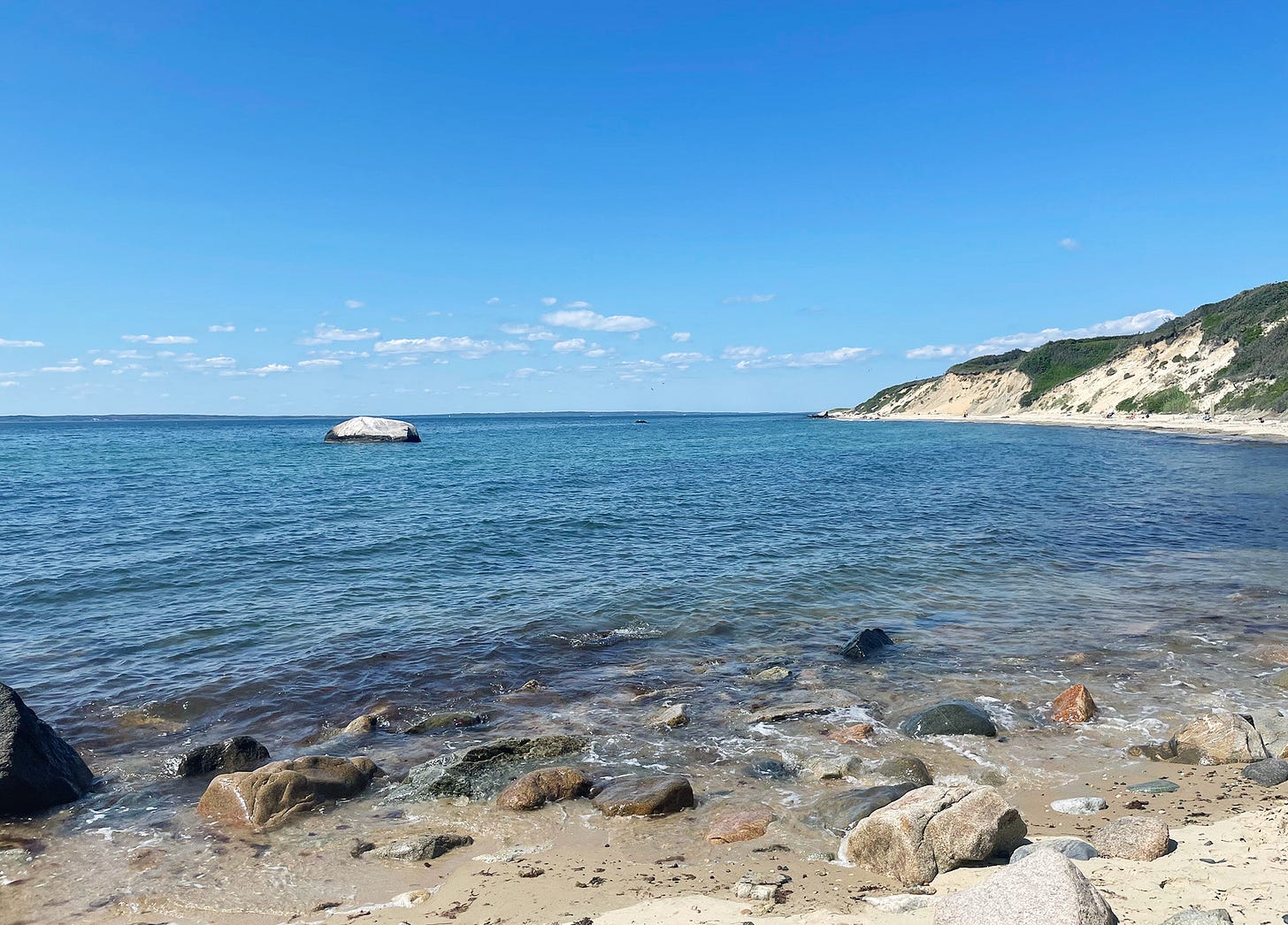Last Sunday evening, we packed up our beach chairs and headed down to Ocean Park to hear the Vineyard Haven Band play its first free outdoor concert of the season. We have a friend who plays saxophone in the band, and we joined his family on the grass.
The round bandstand in Ocean Park resembles a gazebo. High up on the center platform under the roof sit the band members in their navy polo shirts and white pants, while below a carousel of children customarily forms along the brick walkway that rings around the base of the structure.
When the music begins, the children run, skip and dance to the rhythm of the music. Round and round they go, laughing and flailing in that completely unselfconscious way that only children can. And it is pretty much the most delightful, joy-filled activity you could ask to witness as a grumbly, less-than-joy filled adult.
It was a fine evening, clear and warm. We chatted idly as we waited for the first number. The conductor raised her arm, and the magic of music filled the sea air. The first few notes – a prelude – were unfamiliar to me.
But suddenly the melody came clear and I realized it was America the Beautiful.
In a matter of seconds I had a lump in my throat. I turned to my husband and could see that tears were welling up in his eyes. I whispered in his ear, “It’s very sad to listen to this right now.” He nodded.
The band moved on to a mix of classic and modern numbers. I got a big smile on my face when I realized they were playing Defying Gravity from Wicked. There’s so much power and energy and resilience and liberation in Stephen Schwartz’s composition. The children automatically sensed the freedom; they seemed to spin faster and lighter around the bandstand, almost as if they were flying.
As dusk descended and stars dappled the sky, the concert came to an end with The Star Spangled Banner. We stood up for the national anthem, packed up our things, said hello to our friend in the band, and drove home.
I couldn’t stop thinking about the music.
In the days that followed, a different kind of energy permeated the air around me. On Monday, I had a conversation with a Brazilian acquaintance. She told me that she and her husband, after seven years of living and working on the Island, are going back to Brazil next week – to stay. This kind of news might make some people happy, but it made me very sad. They are lovely people.
On Tuesday, I had a conversation with a Black acquaintance who tried to explain to me how scary it is right now for all brown- and black-skinned people (born and raised here, legal citizen, or undocumented immigrant – it doesn’t matter) to have to be looking over their shoulders all the time.
I told her emphatically that I knew, that I understood. Because I’ve been thinking about this a lot. But in truth, there is no way I will ever know what that feels like because of the color of my skin – my acquaintance as much as told me that. Instead of taking offense, I listened and I understood the truth in what she was saying.
Then I learned of a young man who works for someone I know, who went to his immigration check-in at the courthouse (on the Island) just last week and was taken into custody by ICE on the spot.
And even before Wednesday and Thursday, when the Senate and the Congress passed the most regressive budget bill in recent history – one that distinguishes itself (in part) by throwing the most gain to the wealthiest people and the biggest losses to the poorest people – something else made me sick to my stomach: the opening of what is essentially a concentration camp in the Florida Everglades.* One that Republican politicians jokingly (with actual laughter) nicknamed Alligator Alcatraz – and then proceeded to make the name official.
A concentration camp is a place where people are imprisoned who have been rounded up (often for political reasons or because of ethnicity) but NOT given due process of the law, as those contained in a prison have been. Hence, concentration camps tend to house a high percentage of non-criminals. (Note that being an undocumented immigrant is not a federal criminal offense but a civil violation.) And yet these people (human beings) are housed in cages, packed in tightly, with few medical facilities, separated from their loved ones.
How is it funny to imply that an immigration detention center (and this of course is not the first one**) is on par with the most notorious of prisons – and that the occupants should, like the enslaved not so long ago, have to face alligators and pythons should they try to “escape?”
Not surprisingly, Trump sees this one as a “template” for many facilities in other states.* The outrageous cruelty of it all – not to mention the obvious racist longing of a certain contingent of white folks to be rid of brown skinned people altogether – just makes my blood boil. And not in a liberal do-gooder hand-wringing sort of way. As an American citizen.
I have a right to be angry and sad.
By Thursday night, when I normally sit down to start writing my Sunday post, I couldn’t do anything but listen to (and watch) music videos.
I started with Ray Charles’ famous soulful rendition of America the Beautiful, where he starts with the third verse instead of the first. I listened to that a few times. Okay, more than a few times.
Then I listened to Whitney Houston’s electrifying performance of The Star Spangled Banner at Superbowl XXV in 1991.
Then I made the mistake of researching both songs and learned that Francis Scott Key, who wrote The Star Spangled Banner, was an unrepentant racist. I guess I must have known this. But it made me wish that America the Beautiful was our national anthem instead. Because to me it speaks to the land America, the physical America. It’s not perfect; it doesn’t go so far as to acknowledge the people who lived on this land before “we” got here, but it does honor the beauty and sacredness of the land they treasured.
O beautiful for spacious skies, For amber waves of grain, For purple mountain majesties Above the fruited plain!
There is also a bit of the plea within America the Beautiful. At least to me it seems that the last lines of the first verse aren’t a statement of fact but a prayer that God will bless us with brotherhood – that we will be united, coast to coast. (Substitute whatever entities and pronouns make the most sense to you and you have the same sentiment – the hope that the universe will be kind to us and allow us, all of us — to be united.)
America! America!
God shed His grace on thee
And crown thy good with brotherhood
From sea to shining sea!
Well, one can dream. One can have hope. One can love one’s country (more than one even realized) and still be angry. And one can also try to be proactive.
Not to trivialize the situation we’re in by comparing it to a fantasy musical, but I’m afraid we might have to take risks and stick our necks out like Elphaba did in Wicked if we are to stand up for what we believe in and not be dragged along with the pack.
Too late for second guessing.
Too late to go back to sleep.
My new anthem is Defying Gravity. Everyone deserves a chance to fly. 💚
* **Post Script
*As I was struggling to write this, Heather Cox Richardson’s July 5 email came over. It details the extent to which the new budget bill funds ICE, and specifically its detention budget, and goes on to explore the very distinct possibility (which Trump has already suggested), that they will use detainees as a cheap labor force.
Her piece ends with Trump’s diatribe against Democrats this week in Iowa – and how Democrats and other American citizens are likely to be the subjects of harassment by ICE as well.
Here are a couple excerpts, but I think the whole piece, as absolutely terrifying as it is, bears reading and rereading, if only to begin to (or to further) understand the reality of the moment we are in.
“What the law does do, though, is pour $170.7 billion into immigration enforcement—more than the military budgets of all but fifteen countries. The law provides $51.6 billion to build a wall on the border, more than three times what Trump spent on the wall in his first term. It provides $45 billion for detention facilities for Immigration and Customs Enforcement, an increase of 265% in ICE’s annual detention budget. It provides $29.9 billion for ICE enforcement, a threefold increase in ICE’s annual budget.
According to Aaron Reichlin-Melnick of the American Immigration Council, the law gives ICE more funding than the Federal Bureau of Investigations; Drug Enforcement Administration; Bureau of Alcohol, Tobacco, Firearms, and Explosives; U.S. Marshals Service; and Bureau of Prisons combined. In fact, Reichlin-Melnick told Democracy Now!, the law will make ICE the largest federal law enforcement agency “in the history of the nation.”
And this
“Comparing the detention camps to similar programs in other countries, [Tim] Snyder warns that incarcerated workers will likely be offered to employers on special terms, a concept Trump appears to have embraced with his suggestion that the administration will figure out how to put workers back in the fields and businesses by putting them under the authority of those hiring them. Trump has called the idea “owner responsibility.”
**These detention centers are big business. (Of course, it’s all about the money).















Thank you for your thoughts, we all need to defy gravity as this type of legislation is only the beginning. If people do not subscribe to Heather Cox Richardson they should, as terrifying as reality is, she explains the current state of affairs with clarity and history.
Thank you Susie for this beautiful column and for expressing the agony and sadness that so many of us are feeling.
It is devastating to watch what is happening to our country.
Thank you for your wise words of strength.